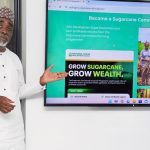The Nigerian government, through the National Sugar Development Council (NSDC), is urging both local and foreign investors to explore opportunities within the country’s sugar sector, emphasizing its robust domestic demand and the potential for a share in the $7 billion African export market.
NSDC’s Executive Secretary and Chief Executive Officer, Kamar Bakrin, revealed during a recent business session in Lagos that Nigeria’s sugar demand stands at approximately two million metric tonnes annually, valued at an estimated $2 billion. He highlighted the profitability and viability of the sector, citing a strong and expanding domestic market.
“The existence of a large and growing domestic demand makes this business viable and profitable,” Bakrin said.
In addition to serving local needs, Bakrin noted that Nigeria’s sugar industry is well-positioned to meet demand across Africa, where the export market potential is valued at $7 billion. The fluctuating exchange rate, he added, has made local sugar production increasingly competitive compared to imports, offering investors a compelling business case.
“The economics are compelling, with high Net Present Value and Internal Rate of Return at attainable scale, and available financing that matches the business need,” Bakrin stated.
Bakrin reaffirmed the government’s commitment to supporting the sugar sector through investment-friendly legislation and an incentive framework that aligns with the NSDC’s Backward Integration Plan. To bolster long-term stability, the NSDC has introduced a community integration model that encourages companies to invest in local development projects.
He explained that under this model, sugar project operators are encouraged to invest in community resources, such as schools, clinics, and roads, and to allocate managerial positions to local hires. “This model ensures all stakeholders at the community level benefit, making the industry more secure and sustainable,” Bakrin said.
Bakrin also pointed to the range of high-value by-products that the sugar sector can produce, including ethanol, bioplastics, and packaging materials, which would further strengthen the local economy.
In a bid to accelerate sectoral growth, the NSDC has declared 2025 as “the year of acceleration” for the sugar industry. The council is actively working on securing funding and supporting the entry of both domestic and international investors. “We are taking deliberate action to accelerate local production… We are also upgrading capacity for training manpower, creating local varieties, and driving best practices,” Bakrin added.
With these developments, Nigeria’s sugar sector is gearing up for an investment boom that could redefine its place in both local and African markets, promising substantial economic benefits and job creation.










